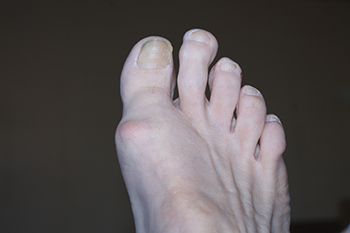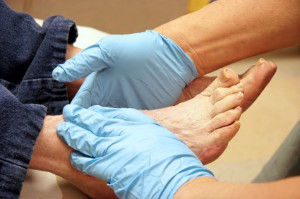
Surgery for Morton’s neuroma is performed to remove thickened nerve tissue in the ball of the foot when conservative treatments no longer provide relief. This condition causes burning pain, tingling, or the feeling of a pebble under the foot, often due to nerve compression from footwear or repetitive stress. Surgery for Morton's neuroma is recommended when symptoms interfere with daily activities, despite other treatments. Recovery time varies but generally takes several weeks, with gradual return to normal footwear and activity. A podiatrist can determine if surgery is the best option, guide you through the process, and provide post-operative care. If foot pain persists, it is strongly suggested that you consult a podiatrist who can discuss the benefits of this type of foot surgery with you.
Foot surgery is sometimes necessary to treat a foot ailment. To learn more, contact Wendy K. Stinson, DPM of New Jersey. Our doctor will assist you with all of your foot and ankle needs.
When Is Surgery Necessary?
Foot and ankle surgery is generally reserved for cases in which less invasive, conservative procedures have failed to alleviate the problem. Some of the cases in which surgery may be necessary include:
- Removing foot deformities like bunions and bone spurs
- Severe arthritis that has caused bone issues
- Cosmetic reconstruction
What Types of Surgery Are There?
The type of surgery you receive will depend on the nature of the problem you have. Some of the possible surgeries include:
- Bunionectomy for painful bunions
- Surgical fusion for realignment of bones
- Neuropathy decompression surgery to treat nerve damage
Benefits of Surgery
Although surgery is usually a last resort, it can provide more complete pain relief compared to non-surgical methods and may allow you to finally resume full activity.
Surgical techniques have also become increasingly sophisticated. Techniques like endoscopic surgery allow for smaller incisions and faster recovery times.
If you have any questions, please feel free to contact our office located in Parsippany-Troy Hills, NJ . We offer the newest diagnostic and treatment technologies for all your foot care needs.

Falls are a leading cause of workplace injuries in the restaurant industry, where fast-paced environments and slippery surfaces increase risk. Preventive measures such as using non-slip floor mats, placing wet floor signs, installing non-slip surfaces on steps, keeping pathways clear, and regularly cleaning greasy floors can greatly reduce accidents. These efforts help protect staff from serious foot and ankle injuries. A podiatrist can assist by treating foot injuries, advising on supportive footwear, and helping staff maintain foot health under demanding conditions. If you work in food service and experience foot pain or injury from a fall, it is suggested that you promptly consult a podiatrist for expert care that supports recovery and helps prevent future complications on the job.
Preventing falls among the elderly is very important. If you are older and have fallen or fear that you are prone to falling, consult with Wendy K. Stinson, DPM from New Jersey. Our doctor will assess your condition and provide you with quality advice and care.
Every 11 seconds, an elderly American is being treated in an emergency room for a fall related injury. Falls are the leading cause of head and hip injuries for those 65 and older. Due to decreases in strength, balance, senses, and lack of awareness, elderly persons are very susceptible to falling. Thankfully, there are a number of things older persons can do to prevent falls.
How to Prevent Falls
Some effective methods that older persons can do to prevent falls include:
- Enrolling in strength and balance exercise program to increase balance and strength
- Periodically having your sight and hearing checked
- Discuss any medications you have with a doctor to see if it increases the risk of falling
- Clearing the house of falling hazards and installing devices like grab bars and railings
- Utilizing a walker or cane
- Wearing shoes that provide good support and cushioning
- Talking to family members about falling and increasing awareness
Falling can be a traumatic and embarrassing experience for elderly persons; this can make them less willing to leave the house, and less willing to talk to someone about their fears of falling. Doing such things, however, will increase the likelihood of tripping or losing one’s balance. Knowing the causes of falling and how to prevent them is the best way to mitigate the risk of serious injury.
If you have any questions, please feel free to contact our office located in Parsippany-Troy Hills, NJ . We offer the newest diagnostic and treatment technologies for all your foot care needs.

Morton’s toe is a common foot condition where the second toe is longer than the big toe. This structural variation can cause an uneven distribution of weight while walking or standing, leading to foot pain and discomfort. People with Morton’s toe may experience symptoms such as pain in the ball of the foot, calluses, or corns between the toes. The longer second toe may also cause imbalance and increased pressure on certain areas, resulting in fatigue or aching feet. A podiatrist can assess your foot structure and recommend treatments like custom orthotics to redistribute pressure, proper footwear to accommodate toe length, and exercises to strengthen foot muscles. Early intervention can help to reduce pain and prevent further complications. If you have this condition, it is suggested that you schedule an appointment with a podiatrist who can offer effective relief solutions.
Toe pain can disrupt your daily activities. If you have any concerns, contact Wendy K. Stinson, DPM of New Jersey. Our doctor can provide the care you need to keep you pain-free and on your feet.
What Causes Toe Pain?
Most severe toe pain is caused due to a sports injury, trauma from dropping something heavy on the toe, or bumping into something rigid. Other problems can develop over time for various reasons.
Toe pain can be caused by one or more ailments. The most common include:
- Trauma
- Sports injury
- Wearing shoes that are too tight
- Arthritis
- Gout
- Corns and calluses
- Hammertoe
- Bunions
- Blisters
- Ingrown toenails
- Sprains
- Fractures (broken bones)
- Dislocations
When to See a Podiatrist
- Severe pain
- Persistent pain that lasts more than a week
- Signs of infection
- Continued swelling
- Pain that prevents walking
Diagnosis
In many cases the cause of toe pain is obvious, but in others, a podiatrist may want to use more advanced methods to determine the problem. These can range from simple visual inspections and sensation tests to X-rays and MRI scans. Prior medical history, family medical history, and any recent physical traumatic events will all be taken into consideration for a proper diagnosis.
Treatment
Treatments for toe pain and injuries vary and may include shoe inserts, padding, taping, medicines, injections, and in some cases, surgery. If you believe that you have broken a toe, please see a podiatrist as soon as possible.
If you have any questions please contact our office located in Parsippany-Troy Hills, NJ . We offer the newest diagnostic and treatment technologies for all your foot and ankle needs.

A diabetic foot ulcer is an open wound or sore that develops on the foot, commonly in individuals with diabetes. It is caused by a combination of poor circulation, nerve damage, and delayed wound healing. Symptoms include redness, swelling, drainage, and, in some cases, infection or foul odor. Among the risk factors are uncontrolled blood sugar, poor foot hygiene, wearing ill-fitting shoes, and a history of foot ulcers. Proper management involves keeping the wound clean, relieving pressure, and monitoring for infection. A podiatrist plays a critical role by providing wound care, custom footwear options, and education to prevent complications. If you have diabetes, it is suggested that you are under the care of a podiatrist who can help you to manage this serious condition.
Diabetic foot care is important in preventing foot ailments such as ulcers. If you are suffering from diabetes or have any other concerns about your feet, contact Wendy K. Stinson, DPM from New Jersey. Our doctor can provide the care you need to keep you pain-free and on your feet.
Diabetic Foot Care
Diabetes affects millions of people every year. The condition can damage blood vessels in many parts of the body, especially the feet. Because of this, taking care of your feet is essential if you have diabetes, and having a podiatrist help monitor your foot health is highly recommended.
The Importance of Caring for Your Feet
- Routinely inspect your feet for bruises or sores.
- Wear socks that fit your feet comfortably.
- Wear comfortable shoes that provide adequate support.
Patients with diabetes should have their doctor monitor their blood levels, as blood sugar levels play such a huge role in diabetic care. Monitoring these levels on a regular basis is highly advised.
It is always best to inform your healthcare professional of any concerns you may have regarding your feet, especially for diabetic patients. Early treatment and routine foot examinations are keys to maintaining proper health, especially because severe complications can arise if proper treatment is not applied.
If you have any questions, please feel free to contact our office located in Parsippany-Troy Hills, NJ . We offer the newest diagnostic and treatment technologies for all your foot care needs.
